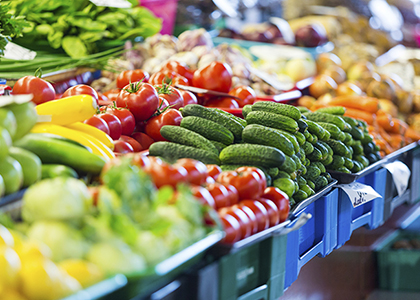
Increase Your Happiness by Eating Fruits and Veggies
By Claire Georgiou, Reboot Naturopath, B.HSc ND
Most of us know that fruits and vegetables are good for us, but it’s always so exciting when completed studies reveal exactly how they are affecting us in the short and long term. A recent study that will be published in the American Journal of Public Health indicates that more fruits and vegetables people consume, the happier they tend to be.
The study followed over 12,000 Australian people over a period of a few years. The results showed that happiness increased incrementally for each extra serving of fruit and vegetables. People who ate eight servings per day were happier in comparison to those who ate five servings each day. The researchers hope these findings would help to persuade more people to eat more fruits and vegetables.
The Centers for Disease Control and Prevention (CDC) analysis concludes that only 13.1 percent of American adults eat enough fruits and only 8.9 percent eat enough vegetables daily, with only 5.5 percent of Australian eating the recommend 5+2 recommendation. Children are also less likely to eat their recommended servings so the happiness factor can really have an impact on their mental health, development and wellness.
This is where juicing can come in: It’s easy to consume eight to 10 servings of fruits and vegetables in one to two juices per day in addition to plenty of whole fruits and vegetables in the diet. Eating a plant-based diet can absolutely support a happy mood along with a healthier weight, excellent energy levels and a significant reduction in many chronic diseases including cancer.
The findings were significant enough to be compared psychologically to someone being unemployed—which is highly associated with depression and feelings of worthlessness—becoming employed. The participants who showed the greatest result were eating next to no fruits and vegetables originally and increased all the way up to eight servings per day!
Professor Andrew Oswald said: “Eating fruit and vegetables apparently boosts our happiness far more quickly than it improves human health. People’s motivation to eat healthy food is weakened by the fact that physical-health benefits, such as protecting against cancer, accrue decades later. However, well-being improvements from increased consumption of fruit and vegetables are closer to immediate.” The researchers hypothesize that the antioxidants—particularly the blood levels of carotenoids—correlated to optimism and may be directly responsible for the happiness factor but more research is needed.
A similar study at the University of Warwick and Dartmouth College, published in the Journal of Social Indicators Research, included 80,000 people, and found that consuming seven 80g (3oz) servings of fruits and veggies every day was the magic number that increased optimal mental well-being and happiness.
It has been estimated that only one in 10 people reach this level of fruit and vegetable servings daily in the UK—plus, 25% of people in the UK eat one to NO serves of fruits and vegetables daily. Statistics tend to be similar across the developed world. I think it’s time for everyone to drink and eat up more servings to gain these benefits and feel well.
From working for many years with our rebooting programs, I know there’s a sense of calm and happiness that people experience while rebooting; the high level nutrient intake seems to make a significant difference in pleasure and happiness levels with no immediate change in their life circumstances. When obstacles arise that would normally upset and stress them out, rebooters feel OK about it and have a better perspective.
So go get yourself some color, consume a rainbow and get happy!